这次来说一下AFURLResponseSerialization这个HTTP响应类。
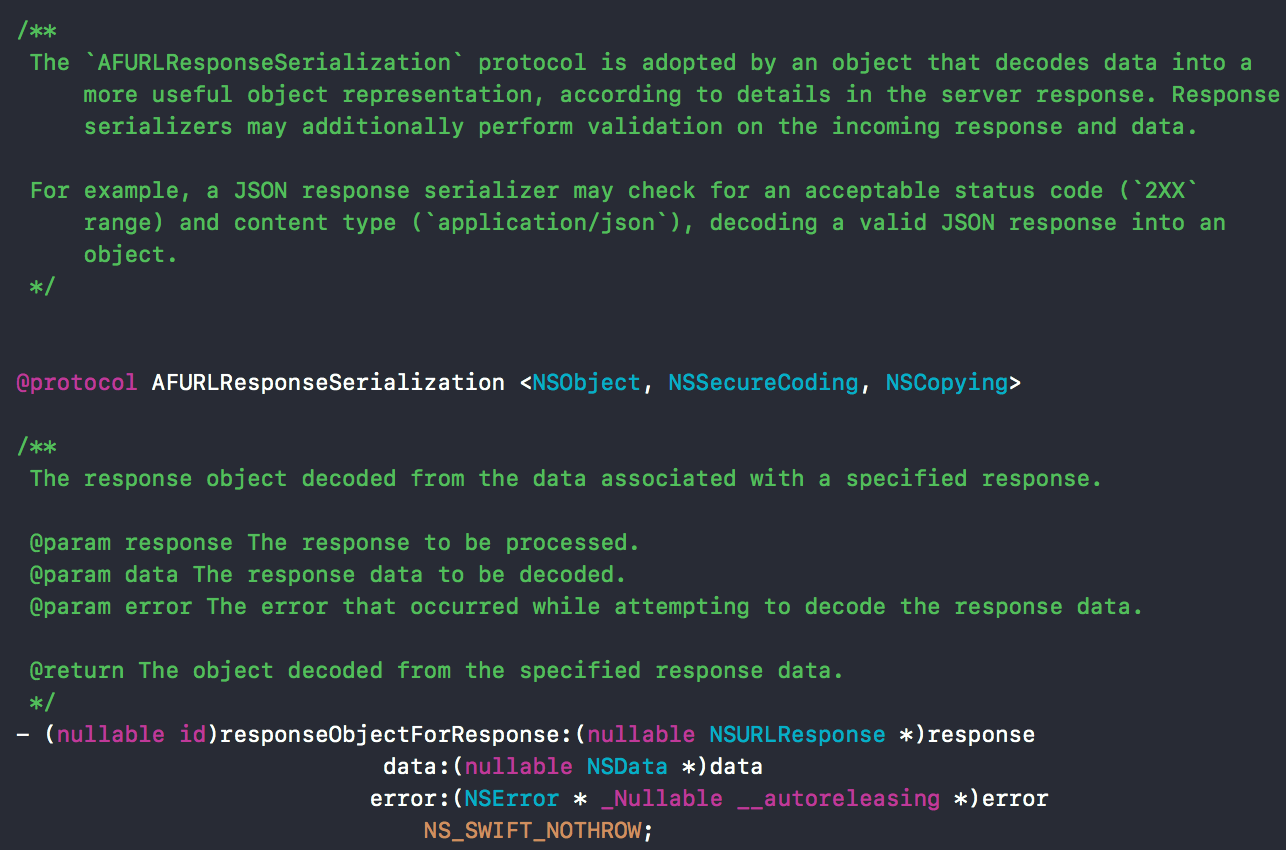
定义了一个协议,该协议返回序列化后的结果。后续的AFHTTPResponseSerializer以及他的子类都遵循了该协议
该类内有很多子类定义,这里借用一张图来展示,之后一个一个来说。
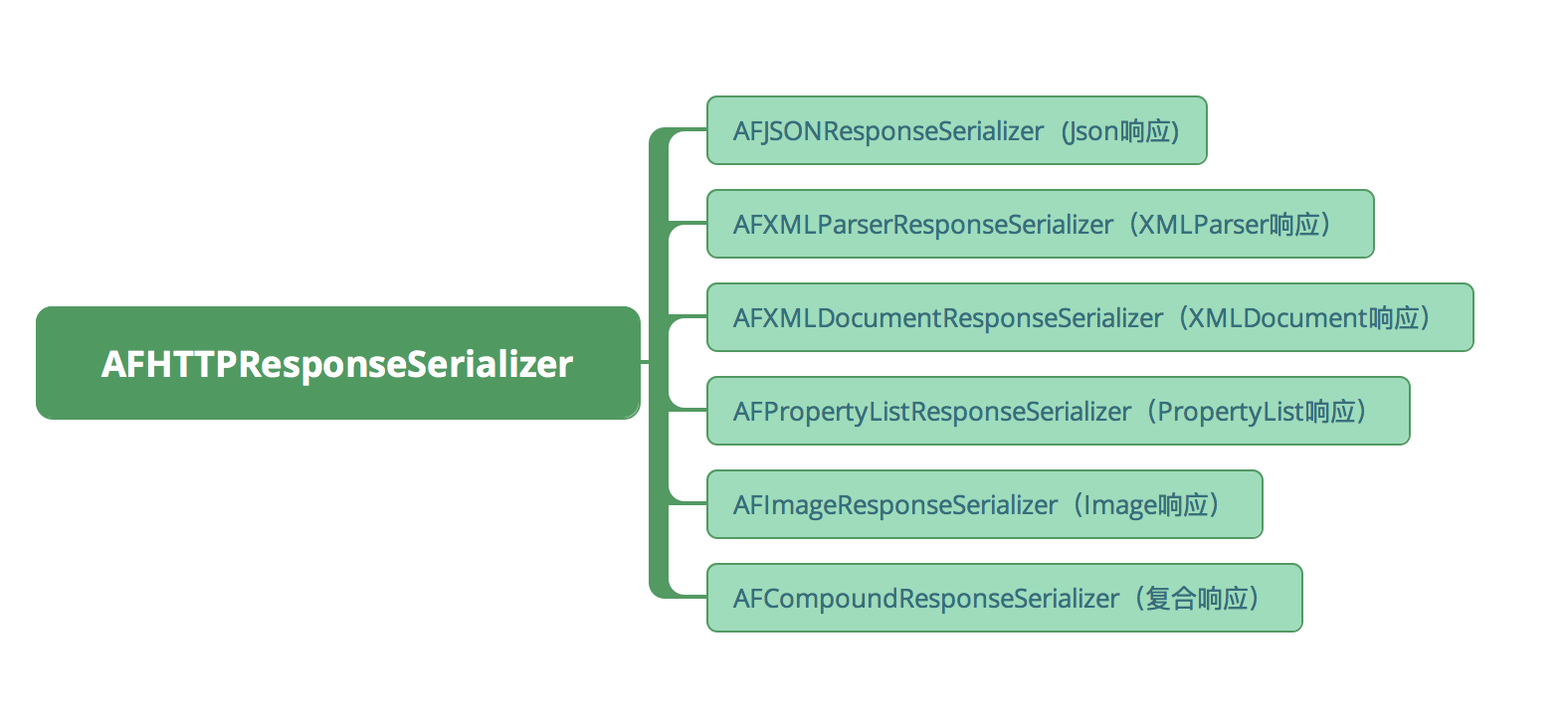
我们先来看下AFHTTPResponseSerializer在头文件中的定义有哪些。
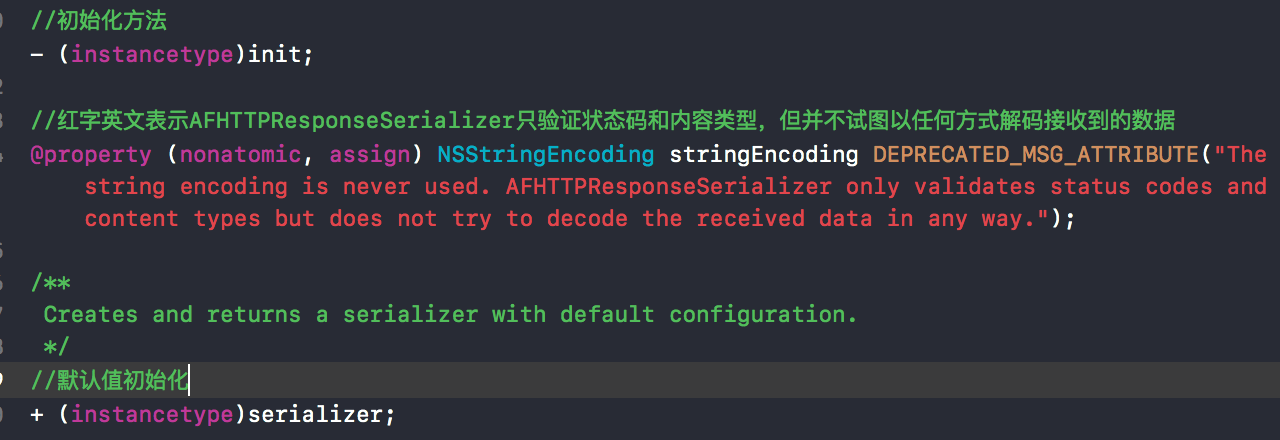
可以看到有两个初始化方法,然后stringEncoding后面有一个宏,这个宏代表这弃用了。
![]()
![]()

来看实现文件的部分。
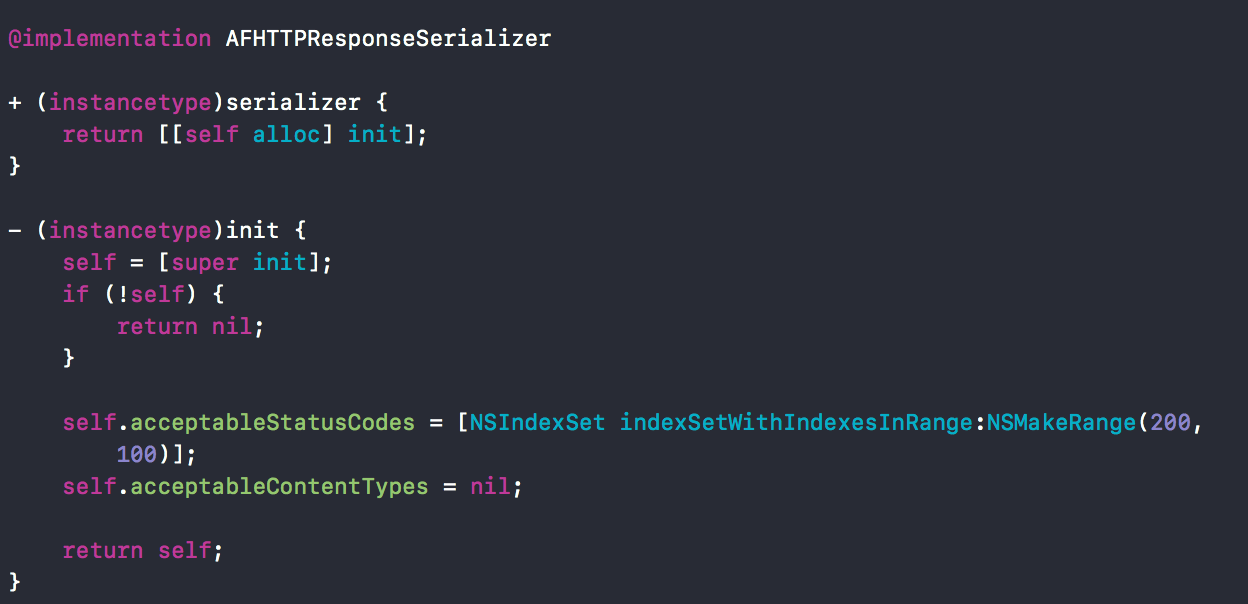
这里有一个NSIndexSet。
NSIndexSet:代表一个不可变的独特的无符号整数的集合,称为索引,因为使用它们的方式。这个集合被称为索引集。你不应该使用索引集存储任意集合的整数值,因为索引集按索引排序范围的方式存储的。这使得它们更有效率比存储单个整数的集合。这也意味着每个索引值指数中只能出现一次。通俗点讲NSIndexSet就是一个唯一的,有序的,无符号整数的集合。
self.acceptableStatusCodes = [NSIndexSet indexSetWithIndexesInRange:NSMakeRange(200, 100)];
表示接受状态码范围200~299。
- (BOOL)validateResponse:(NSHTTPURLResponse *)response data:(NSData *)data error:(NSError * __autoreleasing *)error { BOOL responseIsValid = YES;//默认为yes NSError *validationError = nil; //存在response且为NSHTTPURLResponse类 if (response && [response isKindOfClass:[NSHTTPURLResponse class]]) { //条件:1.acceptableContentTypes存在 2.response的MIMEType不在范围内 3.MIMEType和data均不为空 if (self.acceptableContentTypes && ![self.acceptableContentTypes containsObject:[response MIMEType]] && !([response MIMEType] == nil && [data length] == 0)) { //data长度大于0且respone的URL存在 if ([data length] > 0 && [response URL]) { //定义错误信息字典 NSMutableDictionary *mutableUserInfo = [@{ NSLocalizedDescriptionKey: [NSString stringWithFormat:NSLocalizedStringFromTable(@"Request failed: unacceptable content-type: %@", @"AFNetworking", nil), [response MIMEType]], NSURLErrorFailingURLErrorKey:[response URL], AFNetworkingOperationFailingURLResponseErrorKey: response, } mutableCopy]; if (data) { //错误信息包含data mutableUserInfo[AFNetworkingOperationFailingURLResponseDataErrorKey] = data; } //生成NSerror validationError = AFErrorWithUnderlyingError([NSError errorWithDomain:AFURLResponseSerializationErrorDomain code:NSURLErrorCannotDecodeContentData userInfo:mutableUserInfo], validationError); } responseIsValid = NO; } if (self.acceptableStatusCodes && ![self.acceptableStatusCodes containsIndex:(NSUInteger)response.statusCode] && [response URL]) { NSMutableDictionary *mutableUserInfo = [@{ NSLocalizedDescriptionKey: [NSString stringWithFormat:NSLocalizedStringFromTable(@"Request failed: %@ (%ld)", @"AFNetworking", nil), [NSHTTPURLResponse localizedStringForStatusCode:response.statusCode], (long)response.statusCode], NSURLErrorFailingURLErrorKey:[response URL], AFNetworkingOperationFailingURLResponseErrorKey: response, } mutableCopy]; if (data) { mutableUserInfo[AFNetworkingOperationFailingURLResponseDataErrorKey] = data; } validationError = AFErrorWithUnderlyingError([NSError errorWithDomain:AFURLResponseSerializationErrorDomain code:NSURLErrorBadServerResponse userInfo:mutableUserInfo], validationError); responseIsValid = NO; } } if (error && !responseIsValid) { *error = validationError; } return responseIsValid; }
response有效性验证过程。
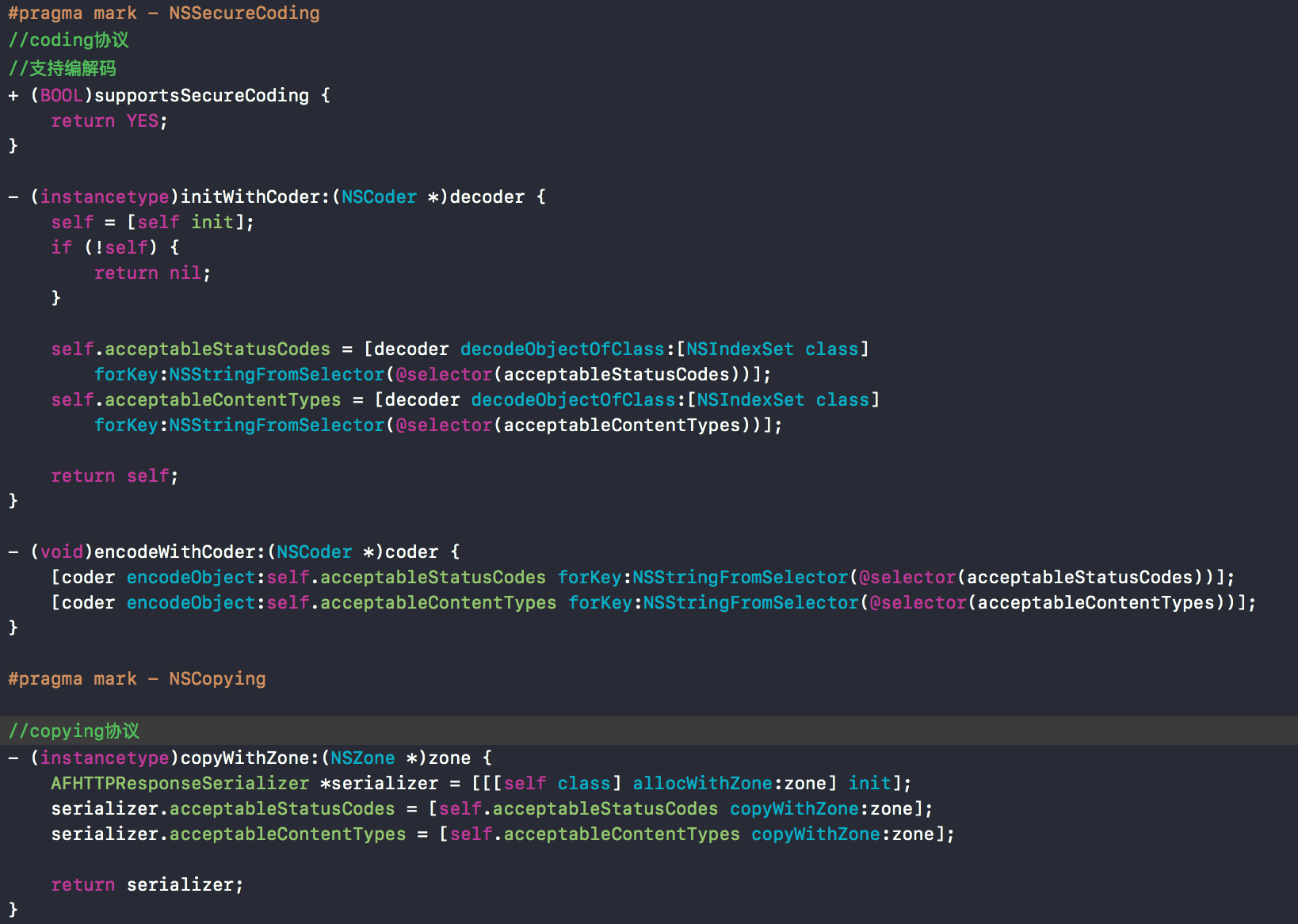
NSSecureCoding, NSCopying协议方法。

![]()
![]()
进入该属性类型NSJSONReadingOptions可以看到是下图这么定义的。

-
NSJSONReadingMutableContainers:返回是可变容器类型如NSMutableArray,NSMutableDictionay。
-
NSJSONReadingMutableLeaves:返回的字符串是NSMutableSting。
-
NSJSONReadingAllowFragments:json结构最外层可以不是NSArray和NSDictionay。

接着来看对应的实现文件部分。
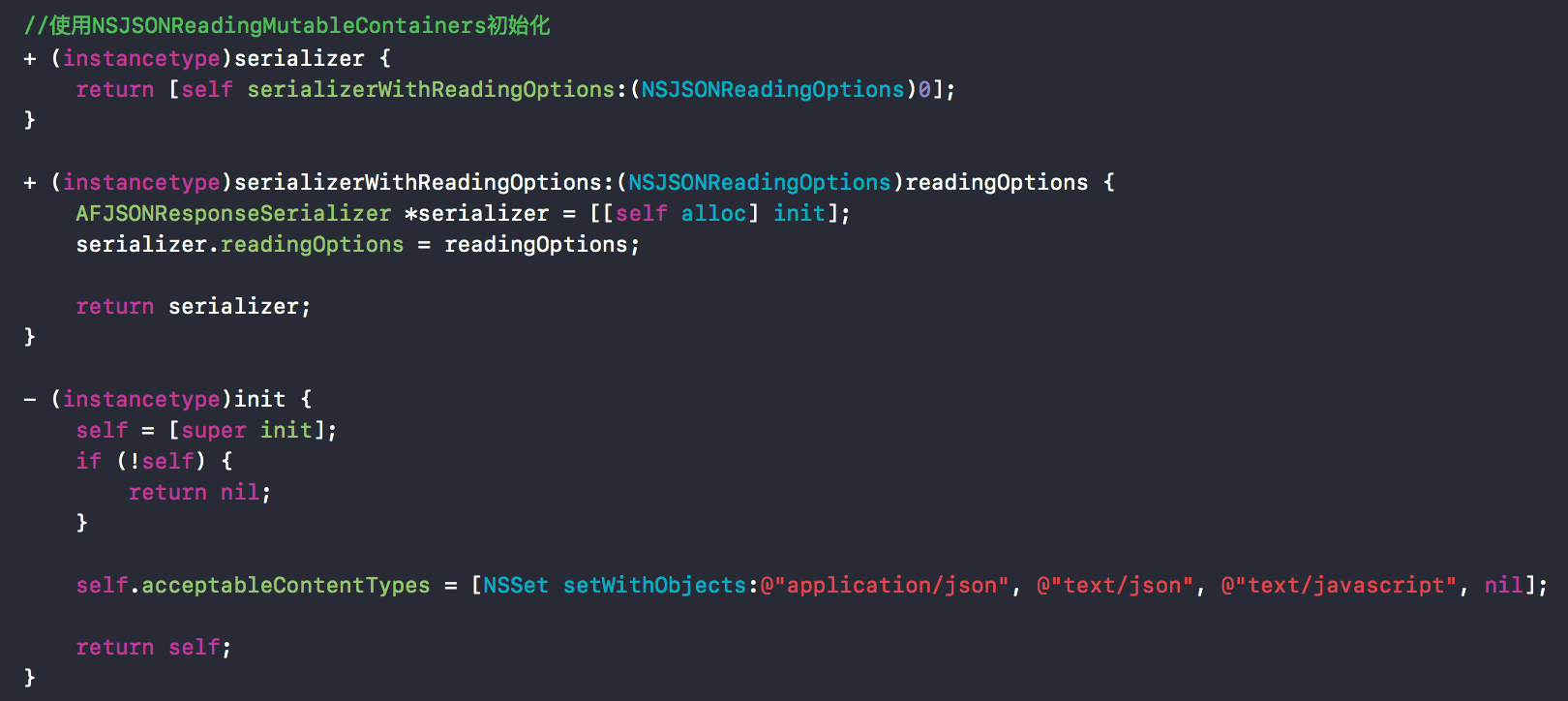
三种初始化方法从init方法中可以看到acceptableContentTypes支持"application/json", "text/json", "text/javascript"三种。
- (id)responseObjectForResponse:(NSURLResponse *)response data:(NSData *)data error:(NSError *__autoreleasing *)error { //response有效性无效 if (![self validateResponse:(NSHTTPURLResponse *)response data:data error:error]) { //无error或者code为NSURLErrorCannotDecodeContentData解析无效,要返回nil if (!error || AFErrorOrUnderlyingErrorHasCodeInDomain(*error, NSURLErrorCannotDecodeContentData, AFURLResponseSerializationErrorDomain)) { return nil; } } // Workaround for behavior of Rails to return a single space for `head :ok` (a workaround for a bug in Safari), which is not interpreted as valid input by NSJSONSerialization. // See https://github.com/rails/rails/issues/1742 //data由空格字符构成也需要返回nil BOOL isSpace = [data isEqualToData:[NSData dataWithBytes:" " length:1]]; if (data.length == 0 || isSpace) { return nil; } NSError *serializationError = nil; id responseObject = [NSJSONSerialization JSONObjectWithData:data options:self.readingOptions error:&serializationError]; if (!responseObject) { if (error) { *error = AFErrorWithUnderlyingError(serializationError, *error); } return nil; } if (self.removesKeysWithNullValues) { return AFJSONObjectByRemovingKeysWithNullValues(responseObject, self.readingOptions); } return responseObject; }
转化和解析方法,这里又出现了两个定义的C函数贴在下面。
static BOOL AFErrorOrUnderlyingErrorHasCodeInDomain(NSError *error, NSInteger code, NSString *domain) { //error的domain和code与入参对影响等直接返回yes if ([error.domain isEqualToString:domain] && error.code == code) { return YES; } else if (error.userInfo[NSUnderlyingErrorKey]) {//否则判断userInfo中key为NSUnderlyingErrorKey是否有值,有递归调用自身 return AFErrorOrUnderlyingErrorHasCodeInDomain(error.userInfo[NSUnderlyingErrorKey], code, domain); } return NO; }
static id AFJSONObjectByRemovingKeysWithNullValues(id JSONObject, NSJSONReadingOptions readingOptions) { //数组类 if ([JSONObject isKindOfClass:[NSArray class]]) { //定义可变数组 NSMutableArray *mutableArray = [NSMutableArray arrayWithCapacity:[(NSArray *)JSONObject count]]; for (id value in (NSArray *)JSONObject) { [mutableArray addObject:AFJSONObjectByRemovingKeysWithNullValues(value, readingOptions)]; } return (readingOptions & NSJSONReadingMutableContainers) ? mutableArray : [NSArray arrayWithArray:mutableArray]; } else if ([JSONObject isKindOfClass:[NSDictionary class]]) {//同上 NSMutableDictionary *mutableDictionary = [NSMutableDictionary dictionaryWithDictionary:JSONObject]; for (id <NSCopying> key in [(NSDictionary *)JSONObject allKeys]) { id value = (NSDictionary *)JSONObject[key];
//去除value为NSNull的key if (!value || [value isEqual:[NSNull null]]) { [mutableDictionary removeObjectForKey:key]; } else if ([value isKindOfClass:[NSArray class]] || [value isKindOfClass:[NSDictionary class]]) { mutableDictionary[key] = AFJSONObjectByRemovingKeysWithNullValues(value, readingOptions); } } return (readingOptions & NSJSONReadingMutableContainers) ? mutableDictionary : [NSDictionary dictionaryWithDictionary:mutableDictionary]; } return JSONObject; }
这里有点好奇为什么不把数组里面的NSNull对象也去掉而只是把字典中value为NSNull的key去掉。
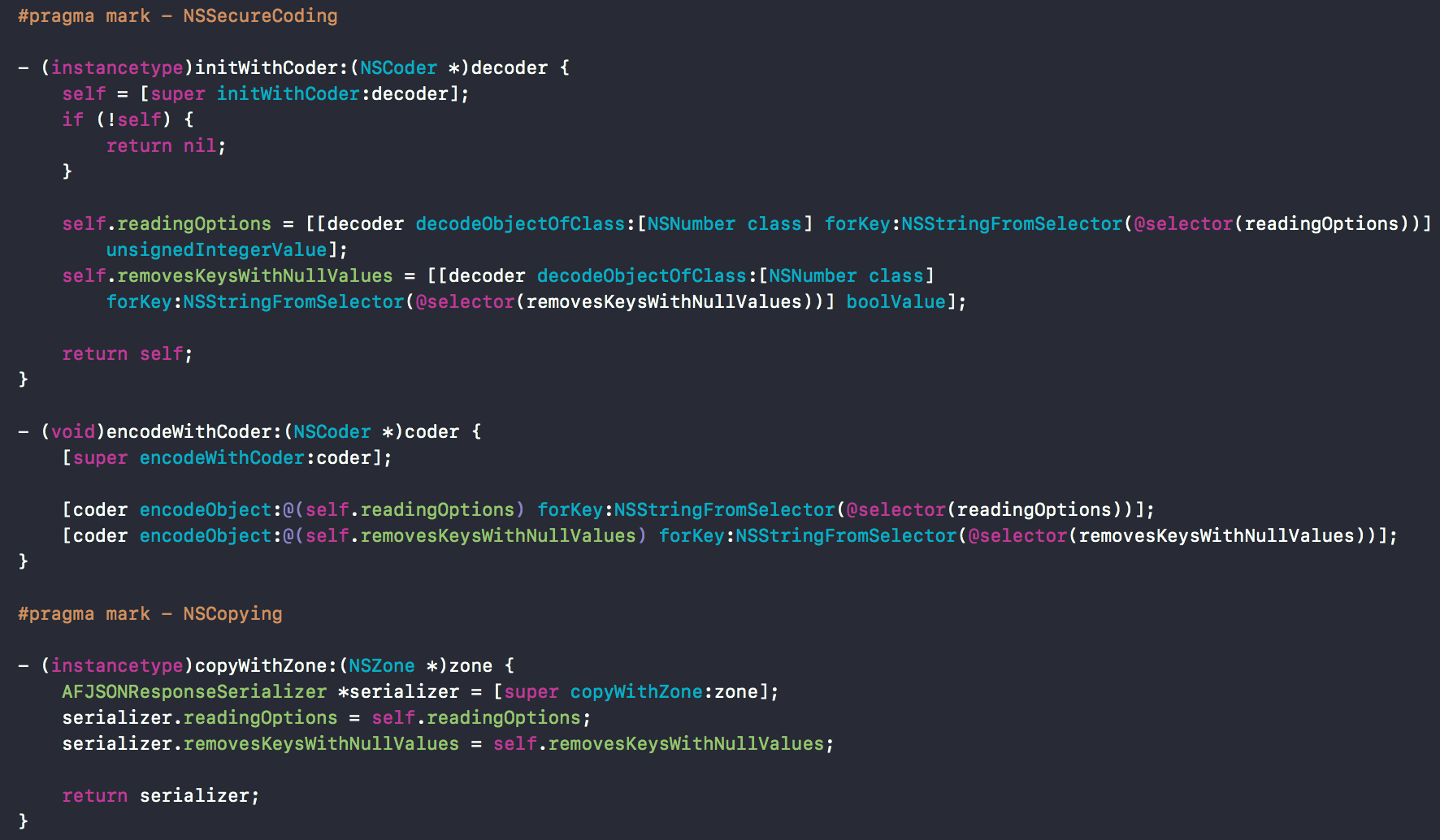
NSSecureCoding, NSCopying协议方法。

![]()
解析XML的子类。
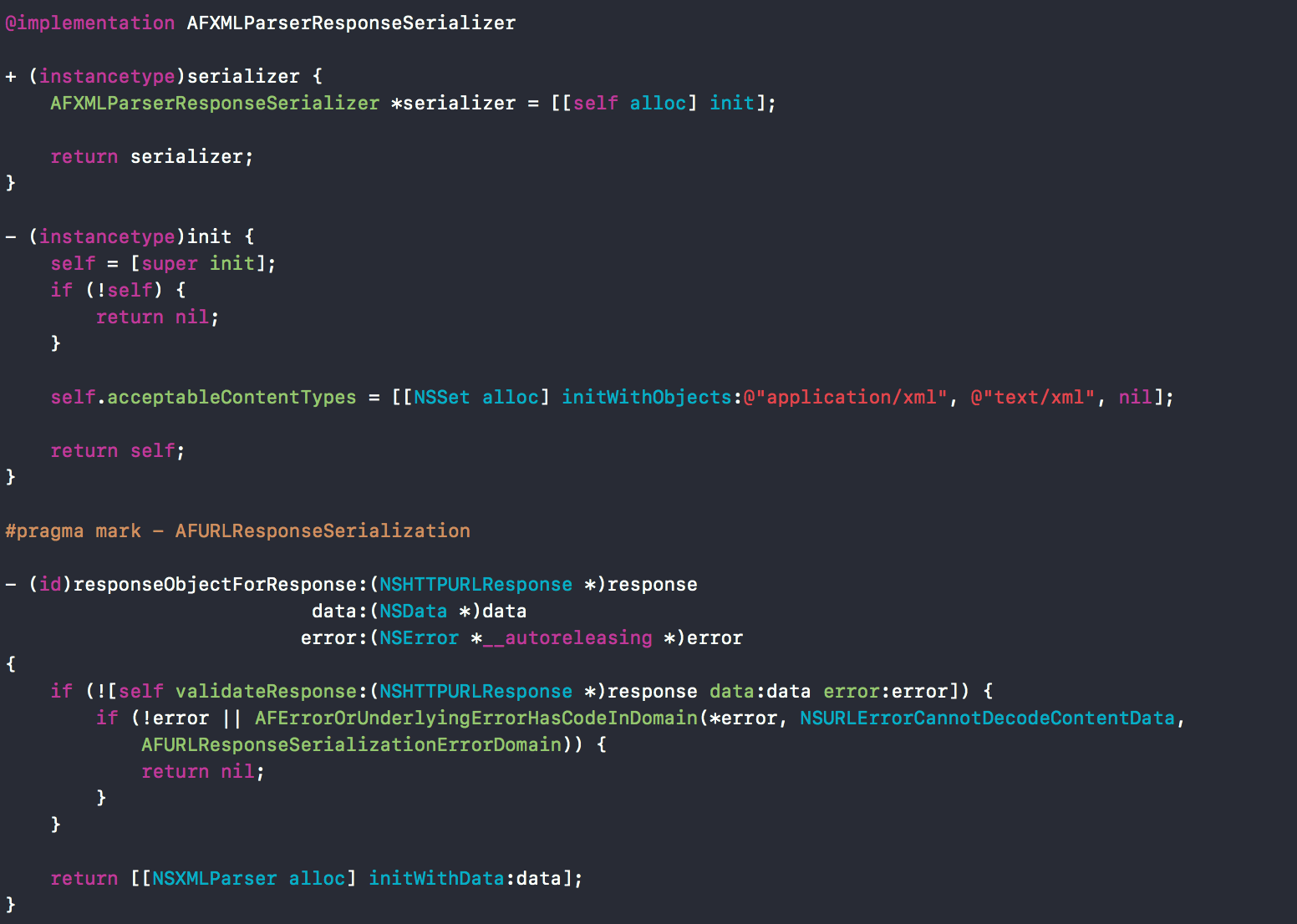
不多说比较好理解。

![]()
将JSON转换为PropertyList用到的子类。

ContentType支持application/x-plist。


这里是UIImage的一个分类,从方法名字上看可以想到是一个安全的NSData转Image的方法。
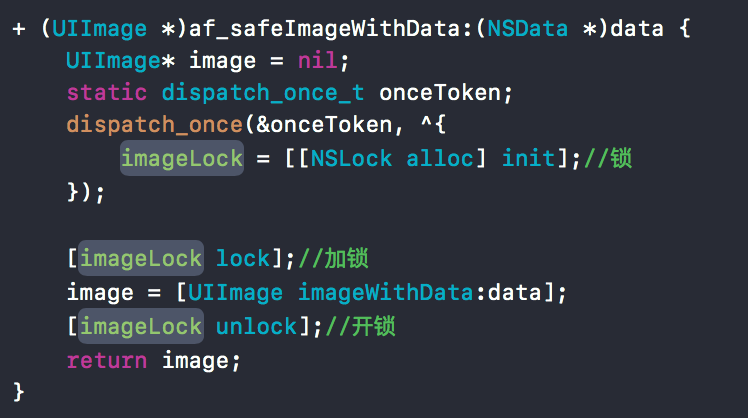
通过NSLock来解决多线程上的一些安全问题。
static UIImage * AFImageWithDataAtScale(NSData *data, CGFloat scale) { UIImage *image = [UIImage af_safeImageWithData:data]; if (image.images) { return image; } return [[UIImage alloc] initWithCGImage:[image CGImage] scale:scale orientation:image.imageOrientation]; } static UIImage * AFInflatedImageFromResponseWithDataAtScale(NSHTTPURLResponse *response, NSData *data, CGFloat scale) { if (!data || [data length] == 0) { return nil; } CGImageRef imageRef = NULL; CGDataProviderRef dataProvider = CGDataProviderCreateWithCFData((__bridge CFDataRef)data); if ([response.MIMEType isEqualToString:@"image/png"]) { imageRef = CGImageCreateWithPNGDataProvider(dataProvider, NULL, true, kCGRenderingIntentDefault); } else if ([response.MIMEType isEqualToString:@"image/jpeg"]) { imageRef = CGImageCreateWithJPEGDataProvider(dataProvider, NULL, true, kCGRenderingIntentDefault); if (imageRef) { CGColorSpaceRef imageColorSpace = CGImageGetColorSpace(imageRef); CGColorSpaceModel imageColorSpaceModel = CGColorSpaceGetModel(imageColorSpace); // CGImageCreateWithJPEGDataProvider does not properly handle CMKY, so fall back to AFImageWithDataAtScale if (imageColorSpaceModel == kCGColorSpaceModelCMYK) { CGImageRelease(imageRef); imageRef = NULL; } } } CGDataProviderRelease(dataProvider); UIImage *image = AFImageWithDataAtScale(data, scale); if (!imageRef) { if (image.images || !image) { return image; } imageRef = CGImageCreateCopy([image CGImage]); if (!imageRef) { return nil; } } size_t width = CGImageGetWidth(imageRef); size_t height = CGImageGetHeight(imageRef); size_t bitsPerComponent = CGImageGetBitsPerComponent(imageRef); if (width * height > 1024 * 1024 || bitsPerComponent > 8) { CGImageRelease(imageRef); return image; } // CGImageGetBytesPerRow() calculates incorrectly in iOS 5.0, so defer to CGBitmapContextCreate size_t bytesPerRow = 0; CGColorSpaceRef colorSpace = CGColorSpaceCreateDeviceRGB(); CGColorSpaceModel colorSpaceModel = CGColorSpaceGetModel(colorSpace); CGBitmapInfo bitmapInfo = CGImageGetBitmapInfo(imageRef); if (colorSpaceModel == kCGColorSpaceModelRGB) { uint32_t alpha = (bitmapInfo & kCGBitmapAlphaInfoMask); #pragma clang diagnostic push #pragma clang diagnostic ignored "-Wassign-enum" if (alpha == kCGImageAlphaNone) { bitmapInfo &= ~kCGBitmapAlphaInfoMask; bitmapInfo |= kCGImageAlphaNoneSkipFirst; } else if (!(alpha == kCGImageAlphaNoneSkipFirst || alpha == kCGImageAlphaNoneSkipLast)) { bitmapInfo &= ~kCGBitmapAlphaInfoMask; bitmapInfo |= kCGImageAlphaPremultipliedFirst; } #pragma clang diagnostic pop } CGContextRef context = CGBitmapContextCreate(NULL, width, height, bitsPerComponent, bytesPerRow, colorSpace, bitmapInfo); CGColorSpaceRelease(colorSpace); if (!context) { CGImageRelease(imageRef); return image; } CGContextDrawImage(context, CGRectMake(0.0f, 0.0f, width, height), imageRef); CGImageRef inflatedImageRef = CGBitmapContextCreateImage(context); CGContextRelease(context); UIImage *inflatedImage = [[UIImage alloc] initWithCGImage:inflatedImageRef scale:scale orientation:image.imageOrientation]; CGImageRelease(inflatedImageRef); CGImageRelease(imageRef); return inflatedImage; }
上面的这些个方法涉及图形图像和CoreGraphics,不是很懂。。以后再补吧,先把代码贴在这里。

![]()
![]()


最后还有个AFCompoundResponseSerializer,也比较简单不常用不多说了。
通过该篇记录下之后需要学习的东西
- CoreGraphics
- NSError